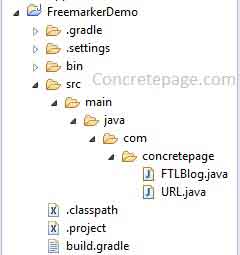How to Add Continue in a Iterator Using Ftl
Java Freemarker Templates (FTL) Tutorial with HTML Example
October 10, 2015
This page will walk through java Freemarker templates (FTL) tutorial with HTML example. Freemarker is an open source powerful template language. It has versatile data model. We can use Freemarker templates for different purposes like generating HTML files, emails, source code etc. Here we will provide a Freemarker template demo to generate a HTML file for a blog step by step.
Freemarker Templates
Freemarker Templates can generate HTML, email, source code, configuration files etc as an output. We need to create a template using Freemarker template language that is also known as FTL. While creating template, we combine our hard coded values and Freemarker code. To use Freemarker, we use syntax as
In our example, we will generate an HTML code using Freemarker template language.
Resolve Freemarker JAR Dependency using Gradle
Find the gradle build file to resolve Freemarker JAR dependency.
build.gradle
apply plugin: 'java' apply plugin: 'eclipse' archivesBaseName = 'Concretepage' version = '1.0-SNAPSHOT' repositories { maven { url "https://repo.spring.io/libs-release" } mavenLocal() mavenCentral() } dependencies { compile 'org.freemarker:freemarker:2.3.23' } Project Structure in Eclipse
Find the project structure in eclipse.

Create HTML Template using Freemarker Template Language
In our example we are creating a HTML template for a blog. This template will generate HTML output with title, body message and reference URLs.
D:\ftl\blog-template.ftl
<html> <head><title> ${blogTitle} </title> <body> <h1> ${blogTitle} </h1> <p> ${message} </p> <h3>References</h3> <#list references as reference> ${reference_index + 1}. <a href="${reference.url}"> ${reference.title} </a> <br/> </#list> </body> </html> Create Configuration Instance
To run the Freemarker template code, first we will create Freemarker Configuration instance that is singleton class.
Configuration cfg = new Configuration(Configuration.VERSION_2_3_23); cfg.setDirectoryForTemplateLoading(new File("D:/ftl")); cfg.setDefaultEncoding("UTF-8"); cfg.setTemplateExceptionHandler(TemplateExceptionHandler.RETHROW_HANDLER); Here we set Freemarker version, location of FTL file, default encoding etc.
Create a Data Model with Java Bean
To create a data model, we are using a java Map with String and Object data type. We will create our java bean to hold the values. The Map key must match with Freemarker template variables.
Map<String, Object> map = new HashMap<>(); map.put("blogTitle", "Freemarker Template Demo"); List<URL> references = new ArrayList<>(); references.add(new URL("http://url1.com","URL One")); We are using following java bean in our example.
URL.java
package com.concretepage; public class URL { private String url; private String title; public URL(String url, String title) { this.url = url; this.title = title; } public String getUrl() { return url; } public void setUrl(String url) { this.url = url; } public String getTitle() { return title; } public void setTitle(String title) { this.title = title; } } Instantiate the Template
Now instantiate Freemarker Template with our template file as follows.
Template template = cfg.getTemplate("blog-template.ftl"); The given template file will be searched in the location configured in Configuration instance.
Process Data Model to generate Output in File and Console
Template has a method as
Template.process(Object dataModel, Writer out)
that process data model in desired output target. To generate output in console, write code as following.
Writer console = new OutputStreamWriter(System.out); template.process(map, console);
To generate code in a file, we can do as follows.
Writer file = new FileWriter (new File("D:/ftl/blog-template-output.html")); template.process(map, file); Main Class with Complete Code
Find the Main class to run our demo.
FTLBlog.java
package com.concretepage; import java.io.File; import java.io.FileWriter; import java.io.IOException; import java.io.OutputStreamWriter; import java.io.Writer; import java.util.ArrayList; import java.util.HashMap; import java.util.List; import java.util.Map; import freemarker.template.Configuration; import freemarker.template.Template; import freemarker.template.TemplateException; import freemarker.template.TemplateExceptionHandler; public class FTLBlog { public static void main(String[] args) { try { //Instantiate Configuration class Configuration cfg = new Configuration(Configuration.VERSION_2_3_23); cfg.setDirectoryForTemplateLoading(new File("D:/ftl")); cfg.setDefaultEncoding("UTF-8"); cfg.setTemplateExceptionHandler(TemplateExceptionHandler.RETHROW_HANDLER); //Create Data Model Map<String, Object> map = new HashMap<>(); map.put("blogTitle", "Freemarker Template Demo"); map.put("message", "Getting started with Freemarker.<br/>Find a simple Freemarker demo."); List<URL> references = new ArrayList<>(); references.add(new URL("http://url1.com","URL One")); references.add(new URL("http://url2.com","URL Two")); references.add(new URL("http://url3.com","URL Three")); map.put("references", references); //Instantiate template Template template = cfg.getTemplate("blog-template.ftl"); //Console output Writer console = new OutputStreamWriter(System.out); template.process(map, console); console.flush(); // File output Writer file = new FileWriter (new File("D:/ftl/blog-template-output.html")); template.process(map, file); file.flush(); file.close(); } catch (IOException e) { e.printStackTrace(); } catch (TemplateException e) { e.printStackTrace(); } } } HTML Output
The output in console and in given html file(D:/ftl/blog-template-output.html) will be as following.
<html> <head><title> Freemarker Template Demo </title> <body> <h1> Freemarker Template Demo </h1> <p> Getting started with Freemarker.<br/>Find a simple Freemarker demo. </p> <h3>References</h3> 1. <a href="http://url1.com"> URL One </a> <br/> 2. <a href="http://url2.com"> URL Two </a> <br/> 3. <a href="http://url3.com"> URL Three </a> <br/> </body> </html>
Download Source Code
Source: https://www.concretepage.com/freemarker/java-freemarker-templates-ftl-tutorial-with-html-example
0 Response to "How to Add Continue in a Iterator Using Ftl"
Post a Comment